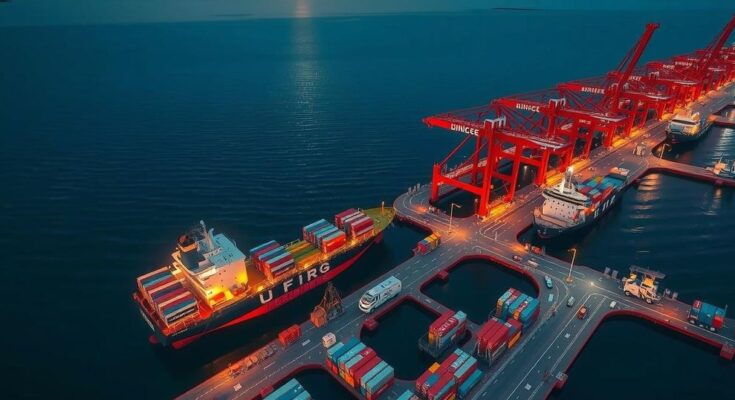The seizure of 43 metric tons of sodium carbonate at Arica Port signifies the port’s pivotal role in Bolivian drug trafficking. The shipment, disguised as tile adhesive, underscores the methods used to evade detection. Proximity to Bolivia and specific customs regulations foster this developing trafficking hotspot, presenting ongoing challenges for Chilean authorities.
The recent seizure of 43 metric tons of sodium carbonate at Arica Port in Chile illuminates its increasing significance as a trafficking nexus for Bolivian drug syndicates. This shipment, falsely labeled as tile adhesive, was reportedly en route to Bolivia and highlights the modus operandi of transport companies seeking to bypass detection. Chilean officials stated the seized sodium carbonate could potentially produce an equivalent weight of cocaine. Prosecutor Mario Carrera remarked that this seizure could be considered one of the most consequential in Chilean history due to both its scale and the economic implications of the drugs that could have been manufactured from the precursor. Sodium carbonate is traditionally used in the production of glass and cleaning agents, but is also integral to the extraction of cocaine from coca leaves. Strategically located near Bolivia, Arica has become vital for the import of precursor chemicals and the export of cocaine. An agreement stemming from a 1904 treaty between Chile and Bolivia provides Bolivian customs officials some level of oversight over cargo passing through this port, which somewhat constrains Chilean authorities’ inspection capabilities. This new seizure adds to a series of substantial drug-related interceptions at Arica, illustrating a troubling pattern of increasing reliance on this port by Bolivian traffickers. Data indicates that approximately 75% of the cargo traffic in Arica is associated with Bolivia, with Bolivian imports through the port increasing by 30% from 2022 to 2023. While Peru, another significant cocaine producer, exists closer geographically, its lengthy coastline renders Arica less pertinent for its drug operations. Factors such as perceived lower corruption levels in Chile enhance the port’s appeal to traffickers, as they are less likely to be scrutinized by customs officials. The recent agreement to reduce tariffs on Bolivian goods further complicates the issue, as it may inadvertently bolster drug trafficking activities through Arica.
The topic of drug trafficking through Arica Port is rooted in the longstanding relationship between Bolivia and Chile, marked by a treaty that grants Bolivia customs control over its cargo. This has facilitated a conducive environment for drug networks operating in Bolivia to exploit the port for trafficking cocaine and precursor chemicals. In recent years, Chilean authorities have ramped up efforts to intercept large quantities of drugs being smuggled at this crucial maritime point, indicating an ongoing struggle against Bolivian drug trafficking operations that have been flourishing amid deregulated customs practices.
In summary, the seizure of sodium carbonate at Arica Port underscores a significant challenge in combating drug trafficking linked to Bolivian networks. The port’s geographical advantages, combined with lenient customs regulations, have escalated its role in the cocaine supply chain. As Bolivian drug traffickers continue to utilize Arica for their operations, authorities are compelled to enhance their vigilance and enforcement strategies to mitigate the flow of narcotics through this pivotal maritime gateway.
Original Source: insightcrime.org




